Ransomware is a malicious software that has become a scourge of the digital age. It holds your digital life hostage, demanding a ransom for the release of your important files and documents. STOP/Djvu Ransomware is one such notorious member of this malicious family. In this post, we will delve into the depths of STOP/Djvu Ransomware, exploring its characteristics, origins, and most importantly, how to protect yourself from falling victim to its clutches.
Understanding STOP/Djvu Ransomware
| Family: | STOP/Djvu Ransomware |
|---|---|
| File Extensions: | ppvt, ppvw, ppvs, zput, zpww, zpas, ithh, itrz, itqw, pthh, ptrz, and more. |
| Ransom Note: | _readme.txt |
| Encryption Algorithm: | Salsa20 |
| Ransom: | Ranges from $490 to $980 (in Bitcoins) |
| Detection: | Ransom.Win32.STOP.bot, Ransom.Win32.STOP.gd, Ransom.Win32.STOP.dd, Ransom.Win32.STOP.vb |
STOP/Djvu Ransomware is a treacherous malware strain known for its file encryption and ransom demands. It encrypts the first 150Kb of files, rendering them inaccessible. To make matters worse, it can also delete Volume Shadow copies, making it nearly impossible for victims to restore their data. Before encrypting, STOP/Djvu often installs additional malware such as Redline, Vidar, Amadey, and DcRat, which can steal sensitive information, compounding the damage.
What Sets STOP/Djvu Apart?
STOP/Djvu is part of a larger ransomware family that shares common characteristics with STOP Ransomware. The name “Djvu” originated from an early version of the malware that added the “.djvu” extension to encrypted files. Interestingly, “.djvu” is also a legitimate file format developed by AT&T for storing scanned documents, akin to the popular “.pdf” format.
How Does STOP/Djvu Work?
Although the original STOP ransomware was discovered in February 2018, it has undergone significant evolution since then. The Djvu variants come with layers of obfuscation, designed to thwart researchers and automated analysis tools. It primarily targets Windows operating systems and employs RSA encryption. Notably, STOP/Djvu offers both offline and online keys for decryption.
Infection Methods
Pirate Software and Torrents
One of the most common ways to encounter STOP/Djvu is by attempting to download cracked software with disabled license checks. These downloads often instruct users to disable antivirus software during installation, inadvertently giving ransomware an entry point.
Fake .exe Files
Another popular infection route involves fake file extensions. For instance, you might unknowingly download a file with a double extension like “.dox.exe.” The user typically won’t notice this, as the file icon resembles a legitimate “.dox” file. Therefore, it’s essential to be vigilant about the file extensions you download.
Malicious Scripts
STOP/Djvu can also spread through malicious scripts found on suspicious websites. These scripts may be encountered when visiting risky websites or sharing files on these platforms. Clicking on misleading pop-ups or signing up for push notifications can also lead to infections.
Spam
Criminals often send spam emails with misleading headers, impersonating shipping companies like DHL or FedEx. These emails may claim to be related to a failed delivery or a shipment you made, but they contain infected attachments. Opening these attachments can have dire consequences.
Collaboration with Other Malware
STOP/Djvu frequently collaborates with other malware, including Redline, Vidar, Amadey, DcRat, and more. For instance, it can deploy information-stealing malware on the victim’s device before encrypting it, making it even more destructive. Djvu can also act as a payload for the SmokeLoader malware dropper family.
Preventing STOP/Djvu Infection
While there’s no foolproof way to avoid ransomware, following some essential rules can significantly reduce your risk of infection:
1. Back Up Your Data
Regularly back up your valuable data to an external medium that’s not connected to your system. This ensures that even if your files get encrypted, you have a safe copy.
2. Keep Software and OS Updated
Always keep your operating system and software up to date. Updates often contain security patches that can protect your system from vulnerabilities.
3. Be Cautious Online
Practice safe online behavior:
- Don’t open emails from unexpected or suspicious sources.
- Avoid clicking on suspicious links and ads.
- Use strong, unique passwords.
- Steer clear of torrents and downloads that offer hacked software or keygens.
In conclusion, STOP/Djvu Ransomware is a malicious entity that can cause significant harm to your digital life. However, by taking precautions and being vigilant, you can minimize the risk of falling victim to this digital threat.
Related FAQs
Q1: Can I recover my files if they are encrypted by STOP/Djvu Ransomware? A1: It’s challenging to recover files once they are encrypted by STOP/Djvu without paying the ransom. However, having up-to-date backups can help you restore your files without succumbing to the ransom demand.
Q2: How can I avoid falling victim to STOP/Djvu Ransomware? A2: To avoid STOP/Djvu and similar ransomware, follow best practices like not opening suspicious emails, refraining from downloading cracked software, and keeping your software and OS up to date.
Q3: Is there a decryption tool available for STOP/Djvu Ransomware? A3: As of my last knowledge update in September 2021, there was no official decryption tool for STOP/Djvu. However, you should regularly check with reputable cybersecurity organizations for any developments in this regard.



